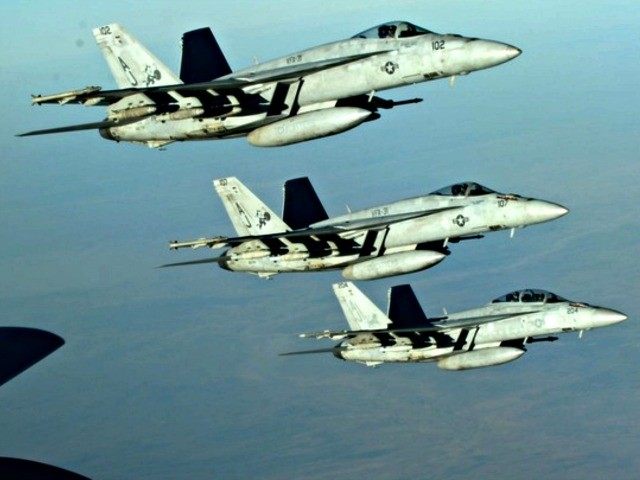The majority of U.S. pilots deployed on air missions targeting the Islamic State (ISIS/ISIL) in Iraq and Syria return to base with their weapons still in tow due to a lack of ground intelligence, reported The Washington Times.
Citing data provided by the U.S. Air Force Central Command, the Times revealed that “the U.S. conducted 7,319 sorties over Iraq and Syria as part of Operation Inherent Resolve in the first four months of 2015. Of those, only 1,859 flights — 25.4 percent — had at least one ‘weapons release.’”
That means that only about one in every four flights actually bombed the enemy.
The Times noted:
Nearly 75 percent of U.S. bombing runs targeting the Islamic State in Iraq and Syria returned to base without firing any weapons in the first four months of 2015, holding their fire mainly because of a lack of ground intelligence and raising questions about President Obama’s key tactic in pushing back an enemy that continues to expand its territory in the war zone.
U.S. ground troops are essential to help American pilots identify targets, Cmdr. Christopher Harmer, a retired Navy helicopter pilot, told the newspaper outlet.
He said that “U.S. airmen are essentially flying half-blind and, as a result, are returning to base with their bombs still in the bay,” stated the article.
“As long as the body politic or president or whoever is making decisions absolutely refuses to put American air controllers on ground, essentially pilots are flying with one eye closed,” explained the commander. “It’s almost impossible for pilots to designate between [Islamic State] fighters and coalition fighters.”
Cmdr. Harmer, currently a senior naval analyst at the Institute for the Study of War’s Middle East Security Project, attributed the slow tempo of bombings, in part, to stringent rules of engagement aimed at eliminating civilian casualties and collateral damage.
Although he feels those restrictions are reasonable, he noted that “while the U.S. may have intelligence on the location of an Islamic State headquarters site, military leaders may be unwilling to strike because of its proximity to civilian sites.”
Richard Brennan, a senior political scientist at the Rand Corporation, believes the rules of engagement must change to make U.S.-led campaign against ISIS work without ground troops.
The Washington Times acknowledged that not all defense analysts agree with Cmdr. Harmer’s position that the lack of U.S. ground troops is the principle reason the majority of American pilots are coming back with their bombs still in tow.
Janine Davidson, senior fellow for defense policy at the Council for Foreign Relations, argued that there are just not as many targets as there were at the start of the anti-ISIS war.
All the analysts who spoke to the Times do agree that the war against ISIS cannot be won by airstrikes alone.
Davidson said that victory is currently being measured by the training and effectiveness of the Iraqi security forces rather than the tempo of the bombings.

COMMENTS
Please let us know if you're having issues with commenting.